87 - Just a Note!
Thursday, December 26, 2013
No blog this week as I am sunning it in Nerja over Christmas with my good friend Nikki.
I have been touched and amazed to see the readership grow throughout 2013, both on the blog's home site at Wordpress, here on the Eye on Spain blog site, and through the new Writers in Spain website. I am immensely grateful to everyone who has read any of the blog since it began in July 2012. I'm especially grateful to those who have taken the trouble to comment - your encouragement and suggestions mean a lot.
In 2014 the blog will continue, but perhaps more sporadically. It may be fortnightly, or simply as the mood takes me. I will continue to share the language points, as much because writing it down after the blog helps get it clear in MY head!
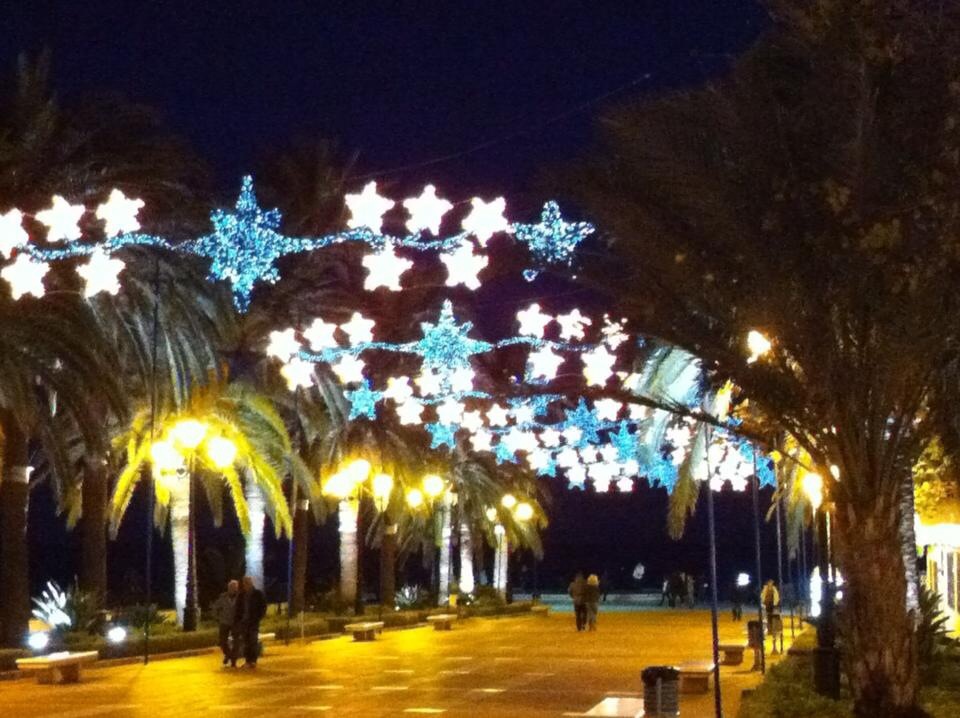 Finally may I wish all readers, regular, one-off or accidental, season's greetings and a happy new year. Finally may I wish all readers, regular, one-off or accidental, season's greetings and a happy new year.
Felices fiestas y un prospero año nuevo!
LANGUAGE POINT - please don't forget that tilde over the n (ie the ñ) in año. Nobody wants to be wished a prosperous new anus.
© Tamara Essex 2013
 0
Like
Published at 8:16 PM Comments (0)
0
Like
Published at 8:16 PM Comments (0)
86 - Two Faces of December
Thursday, December 19, 2013
Oh yes! It's that time of year again. And Spain does Christmas so well. The lights are up, and in every corner a little nativity scene is built.
Oh no! It's that time of year again. And Spain does fiestas so well. The chorizo is sliced and the mosto decanted, and Colmenar prepares for its Fiesta de Mosto y Chacina - officially a Ruta de Tapas, unofficially the bar-crawl round every bar in the village.
I love Málaga. It's an often under-rated city, frequently just passed through en route to coastal resorts. Yet for anyone who stops awhile to get to know it, it is full of hidden gems. Especially at Christmas. Last year's plasticene nativity scene was unforgettable (photos of that can be seen here).
I love Colmenar. My 17 months here (feels so much longer!) have only reinforced my attachment to my adopted village. I love Colmenar when it is quiet, but it too comes into its own at fiesta time. Oh boy these folks know how to throw a party!
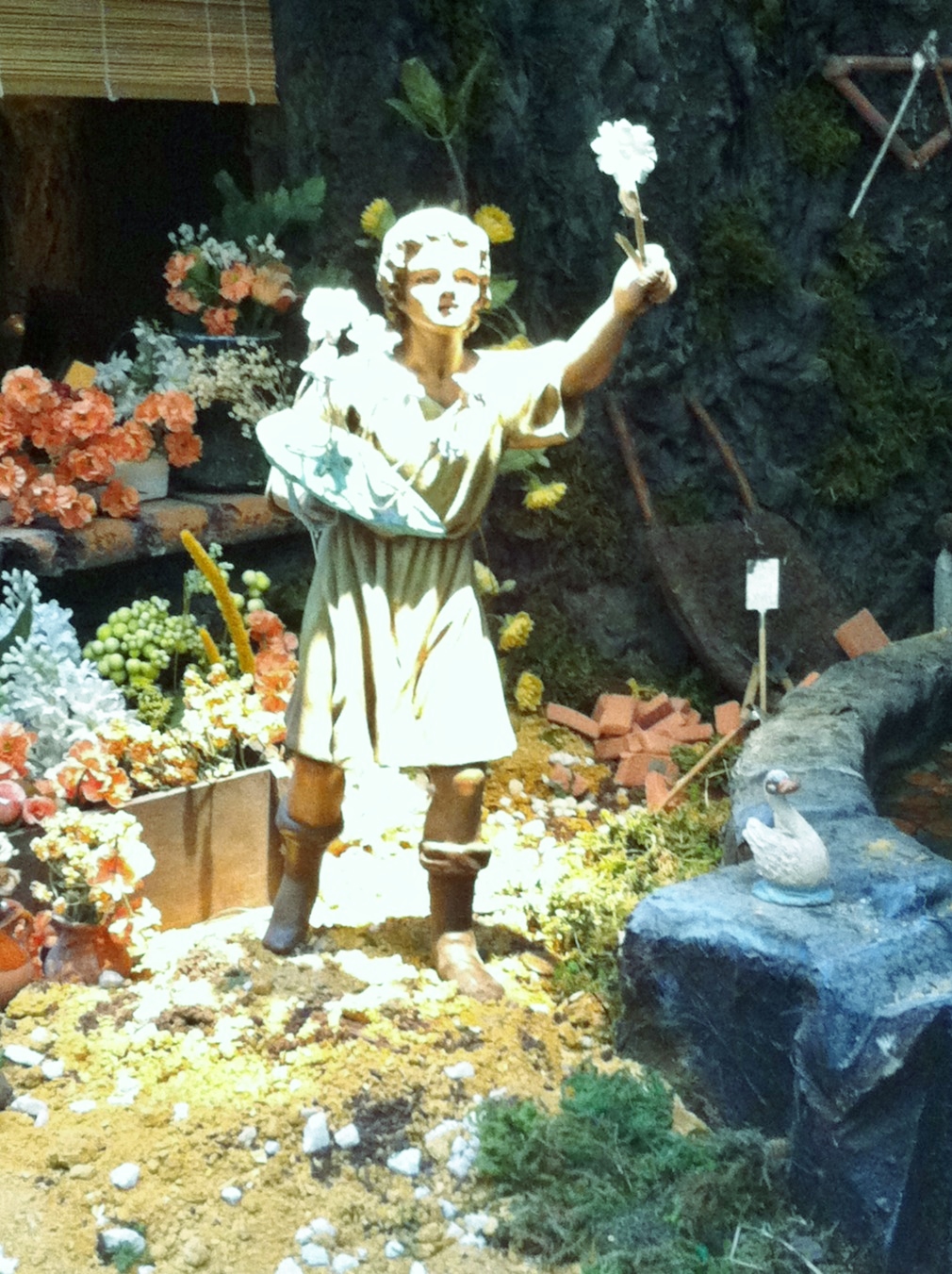 So, list of Malaga's belenes (nativity scenes) in hand, the journey begins. First stop is the Ayuntamiento. It's one of the biggest belenes and always beautifully presented. This, and the little bar inside Riogordo town hall, always reminds me of how different English town halls are from their Spanish counterparts. Not too much of a queue, and the policia local point the way for us to shuffle past the belén. So, list of Malaga's belenes (nativity scenes) in hand, the journey begins. First stop is the Ayuntamiento. It's one of the biggest belenes and always beautifully presented. This, and the little bar inside Riogordo town hall, always reminds me of how different English town halls are from their Spanish counterparts. Not too much of a queue, and the policia local point the way for us to shuffle past the belén.
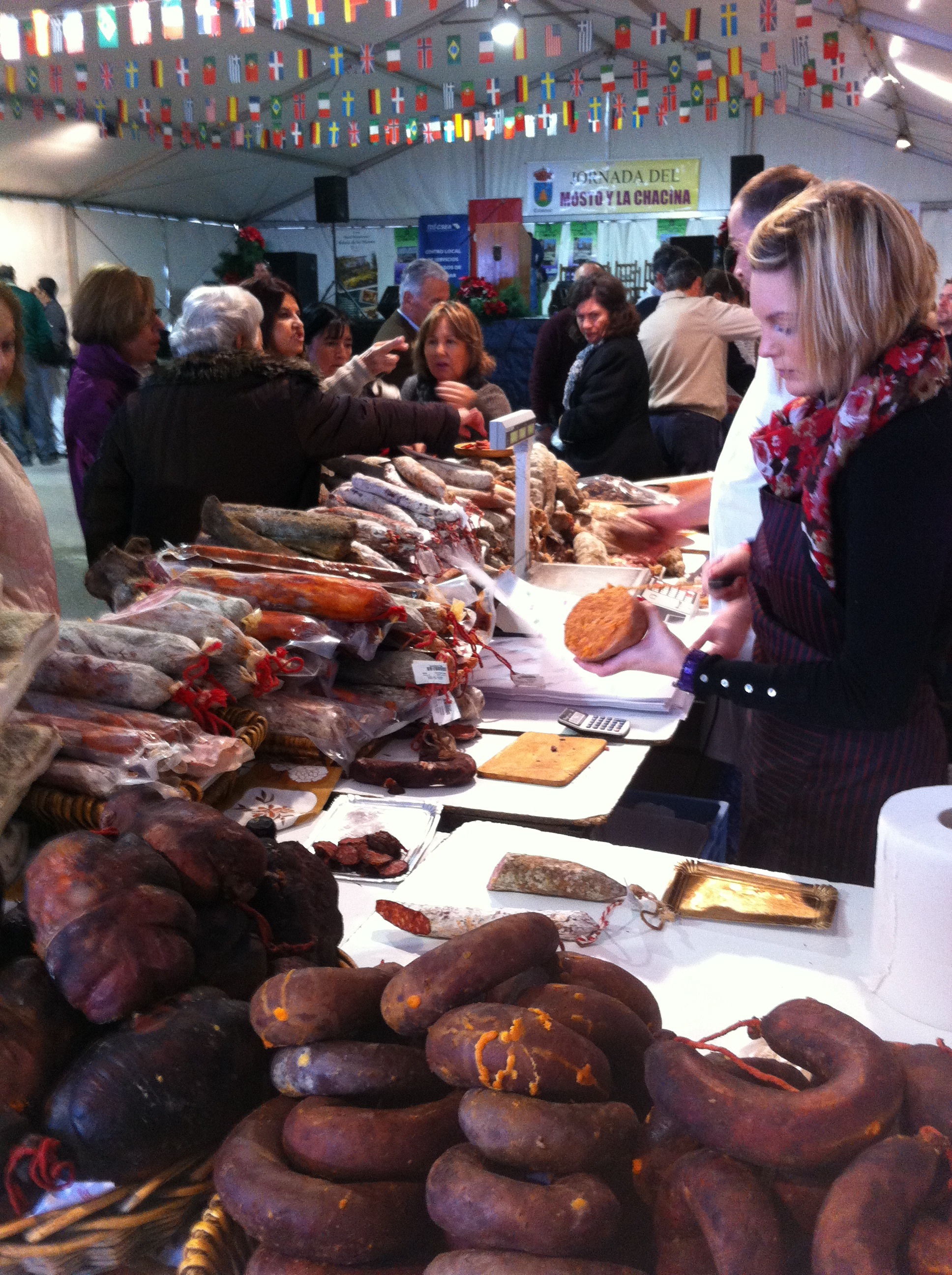 So, list of Colmenar's bars in hand, the journey begins. First stop is the big tent by the silo, to browse the stalls, sample the embutidos for which Colmenar is famous (sausage, chorizo, and other pork products) then pick up the card for all the bars to stamp as we wend our way round the village. Then it's on to Bar Los Pepes in the centre, to await our Malagueño friends off the bus. After a frantic search on all the bar's shelves, the stamp is found and our cards are marked. Tapas in Bar Bartola gives us our second tick. So, list of Colmenar's bars in hand, the journey begins. First stop is the big tent by the silo, to browse the stalls, sample the embutidos for which Colmenar is famous (sausage, chorizo, and other pork products) then pick up the card for all the bars to stamp as we wend our way round the village. Then it's on to Bar Los Pepes in the centre, to await our Malagueño friends off the bus. After a frantic search on all the bar's shelves, the stamp is found and our cards are marked. Tapas in Bar Bartola gives us our second tick.
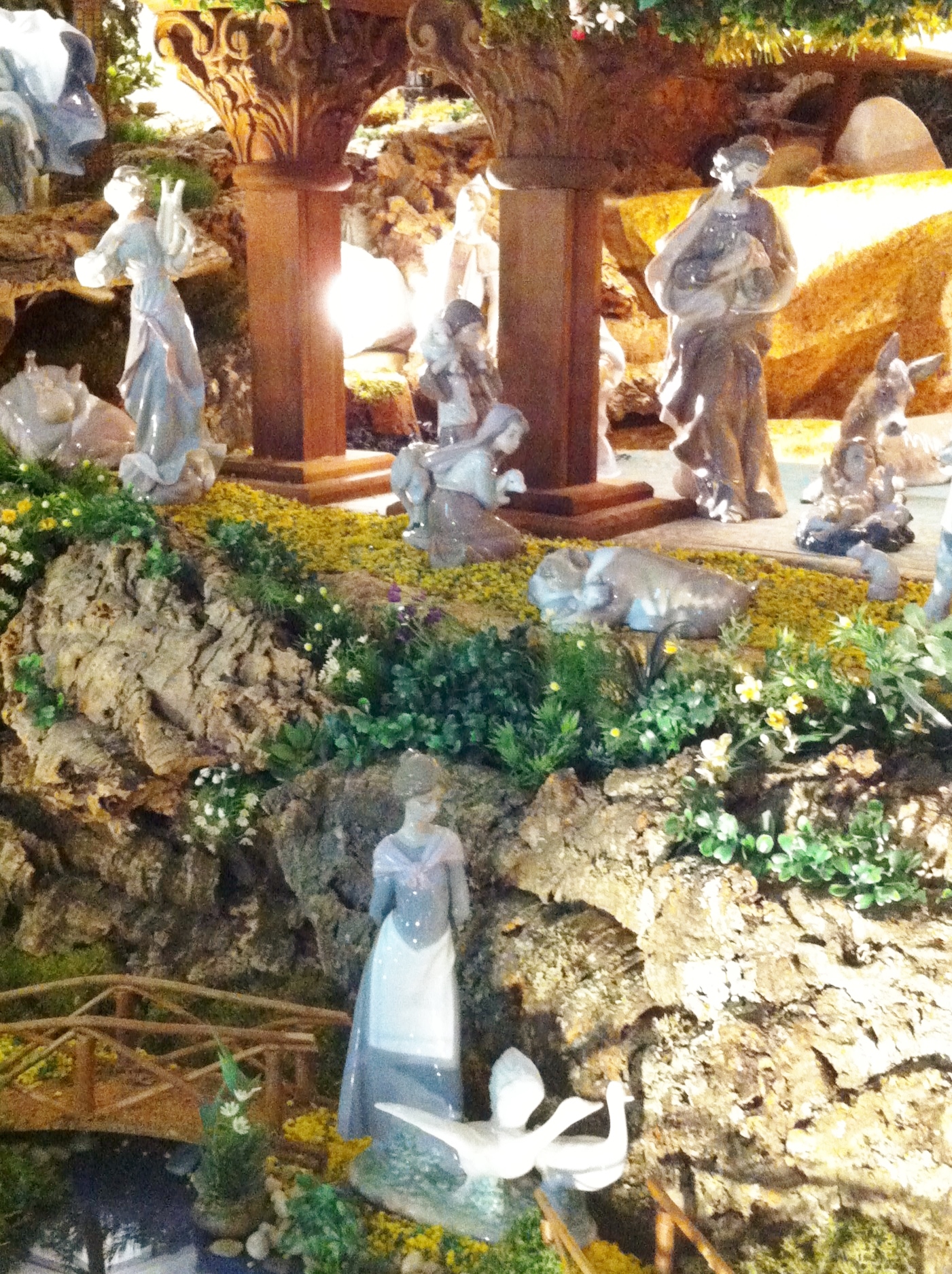 Over to the Museo Carmen Thyssen where a small but beautiful belén is bathed in natural light from the stunning pyramid skylight that sits atop the building. Then a short walk north to the Museo de Vidrio y Cristal where all the figures on the belén are Lladró porcelain. This is a real delight, so unusual, and it was a particular joy for me to see the little "Girl with Geese" piece that I have, at the foot of the scene. So much to see within one artwork (for it surely is art, isn't it?) – truly unforgettable. Over to the Museo Carmen Thyssen where a small but beautiful belén is bathed in natural light from the stunning pyramid skylight that sits atop the building. Then a short walk north to the Museo de Vidrio y Cristal where all the figures on the belén are Lladró porcelain. This is a real delight, so unusual, and it was a particular joy for me to see the little "Girl with Geese" piece that I have, at the foot of the scene. So much to see within one artwork (for it surely is art, isn't it?) – truly unforgettable.
We wander up the hill to Balcon de Los Montes and to Hotel Belén. Again we seem to be the first people asking for our cards to be stamped, and a little confusion ensues before the official stamp and ink-pad are found. Outside Hotel Belén, two coaches from Manilva decant their passengers. Our village Ruta de Tapas is drawing the crowds.
Disappointment at the cathedral. The simple outdoor nativity figures are in place by the west door, but the indoor nativity isn't finished. Despite the dates printed on the official list of belenes, this one will not be available for another week.
Disappointment at Bar Tele-Club. The promised tapas of migas is not available. But another round of mosto is ordered (it's sort of a cross between wine and sherry, only rougher!) and the cards are stamped. On to Peña Flamenca where our Malagueño friends continue to knock back the mosto, while the rest of us move onto softer things.
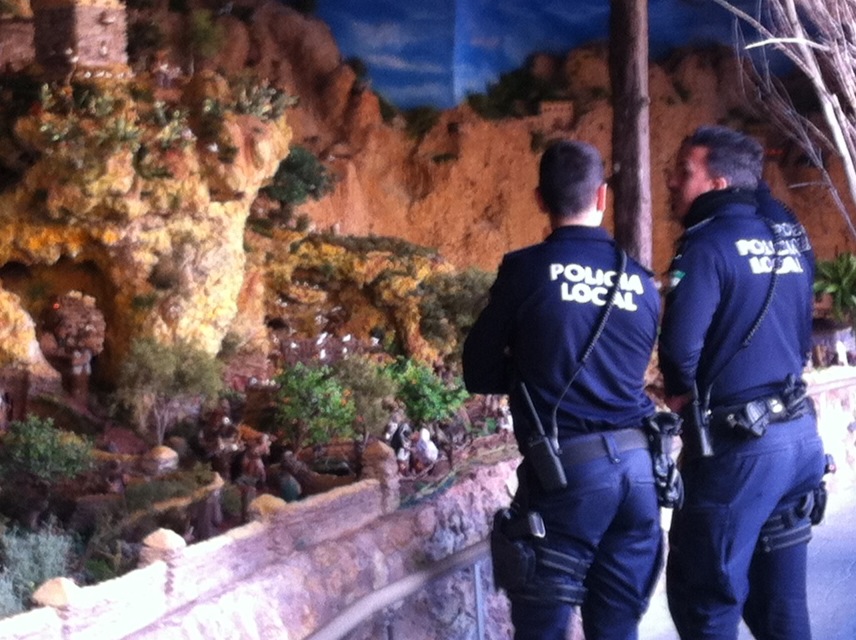 In Málaga, a short drive to the east of the city centre, just north of Pedregalejo, is an amazing demonstration of community spirit. The Barriada (neighbourhood) La Mosca has created the biggest belén at about 50ft long. All hand-made by local people, the buildings, figures, countryside and backdrops come together to create a stunning effect. Two volunteers from the nearby houses are on duty. Three Policía Local with guns patrolling an almost-deserted suburban nativity scene strikes me as odd, until they explain they are not guarding the belén but have taken a short break to come and admire it. They are tourists, just like me. In Málaga, a short drive to the east of the city centre, just north of Pedregalejo, is an amazing demonstration of community spirit. The Barriada (neighbourhood) La Mosca has created the biggest belén at about 50ft long. All hand-made by local people, the buildings, figures, countryside and backdrops come together to create a stunning effect. Two volunteers from the nearby houses are on duty. Three Policía Local with guns patrolling an almost-deserted suburban nativity scene strikes me as odd, until they explain they are not guarding the belén but have taken a short break to come and admire it. They are tourists, just like me.
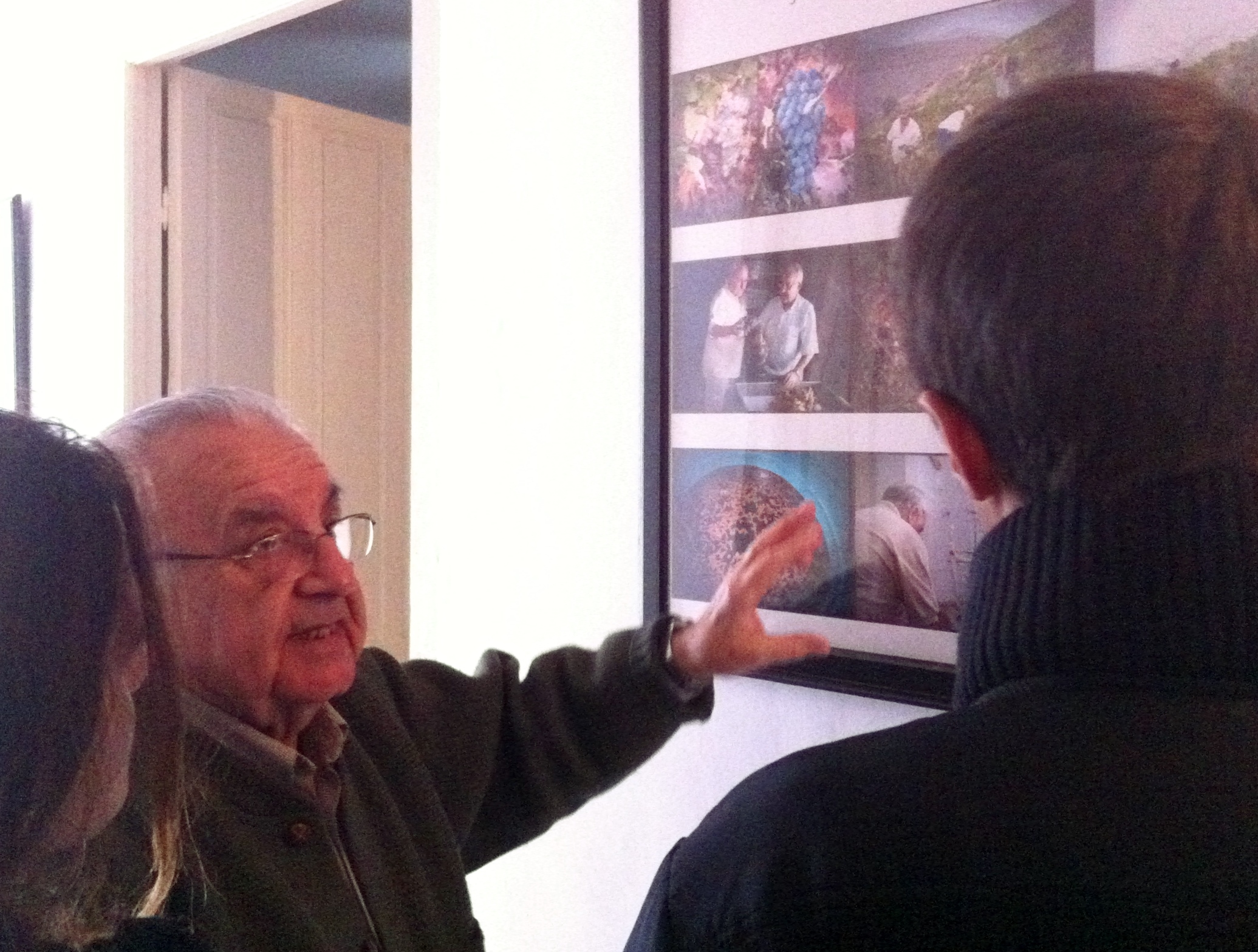 At the Bodega José Molino, José himself as always proudly shows off the pictures of his vineyards and explains the grapes and the processes. The all-important stamp has been mislaid, so we depart with José's signature in the box on our cards. We like it. We realise that we won't complete the full list of eleven bars in time to enter our cards into the raffle, so the cards themselves will be our prize. We like that too. Bar La Ventorro and Méson Pilar provide two more drinks, two more tapas, and two more stamps. At this stage the Malagueños have to get the last bus home. We locals are content that our visitors enjoyed seeing Colmenar en fiesta. At the Bodega José Molino, José himself as always proudly shows off the pictures of his vineyards and explains the grapes and the processes. The all-important stamp has been mislaid, so we depart with José's signature in the box on our cards. We like it. We realise that we won't complete the full list of eleven bars in time to enter our cards into the raffle, so the cards themselves will be our prize. We like that too. Bar La Ventorro and Méson Pilar provide two more drinks, two more tapas, and two more stamps. At this stage the Malagueños have to get the last bus home. We locals are content that our visitors enjoyed seeing Colmenar en fiesta.
Wandering the back-streets of Málaga it is the odd corners that provide the joys. A tiny house with a wreath or a few candles, a little shop with a miniature tree and some lights. Christmas is a week away, and in far-away corners of many different countries, people are connected, preparing in the same way. Málaga, like London, Paris, Madrid, Prague and Shaftesbury, is en fiesta.
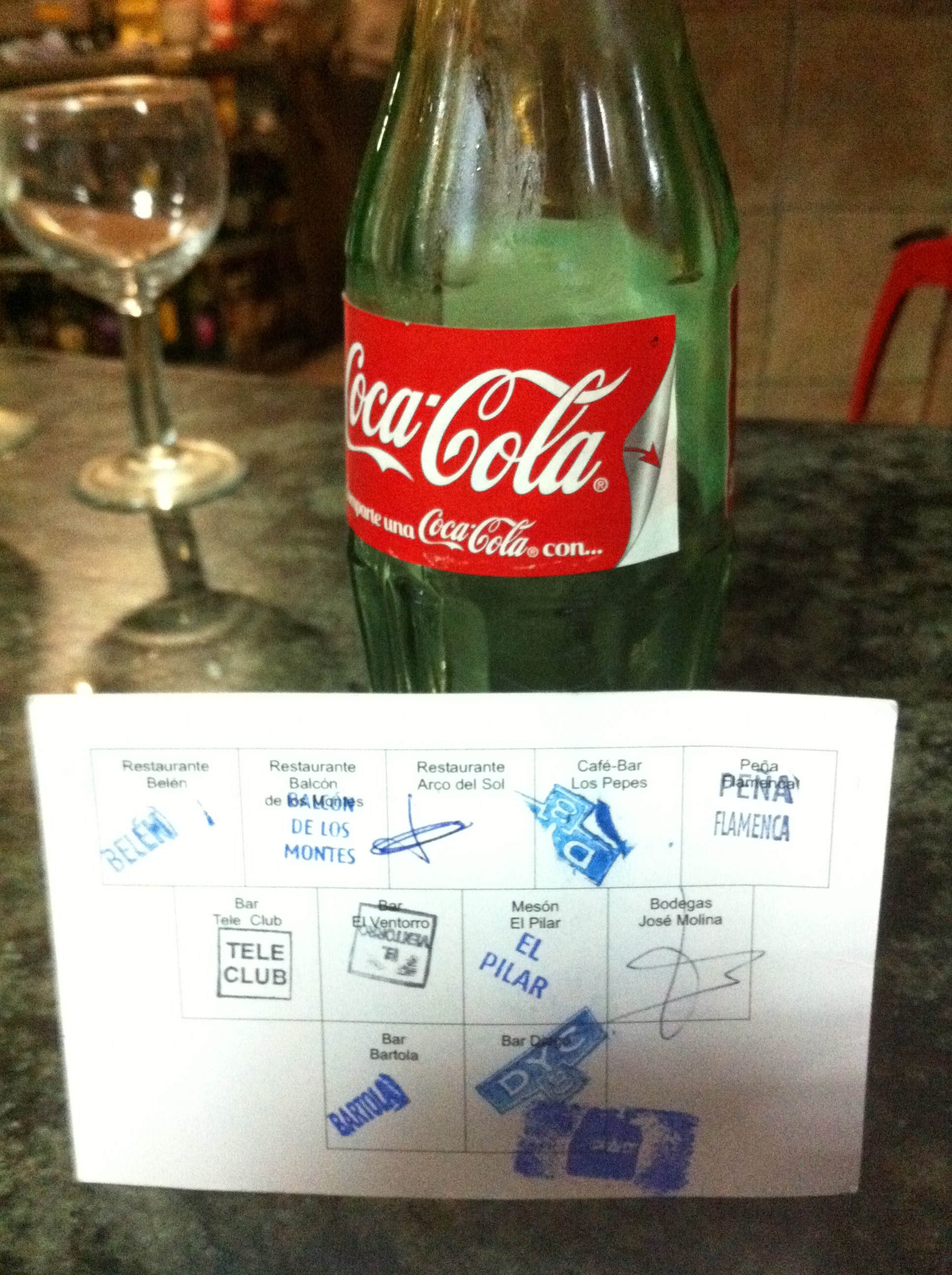 We have to go a bit further to find our final two destinations. Bar Diego is up the hill but is worth the climb to get the second-to-last stamp. It's getting dark as we head out to Arco del Sol, so as Rosa searches for the stamp, we decide to stay awhile. Our feet under the table, the night falling around us, Rosa brings plates of lamb stew with grapes and the finest chips in all of Spain. Best of all, the missing stamp is found. A final coffee, complimentary rosquillas, and the task is done. Stomachs and cards full. Satisfaction all round. Journey over. We have to go a bit further to find our final two destinations. Bar Diego is up the hill but is worth the climb to get the second-to-last stamp. It's getting dark as we head out to Arco del Sol, so as Rosa searches for the stamp, we decide to stay awhile. Our feet under the table, the night falling around us, Rosa brings plates of lamb stew with grapes and the finest chips in all of Spain. Best of all, the missing stamp is found. A final coffee, complimentary rosquillas, and the task is done. Stomachs and cards full. Satisfaction all round. Journey over.
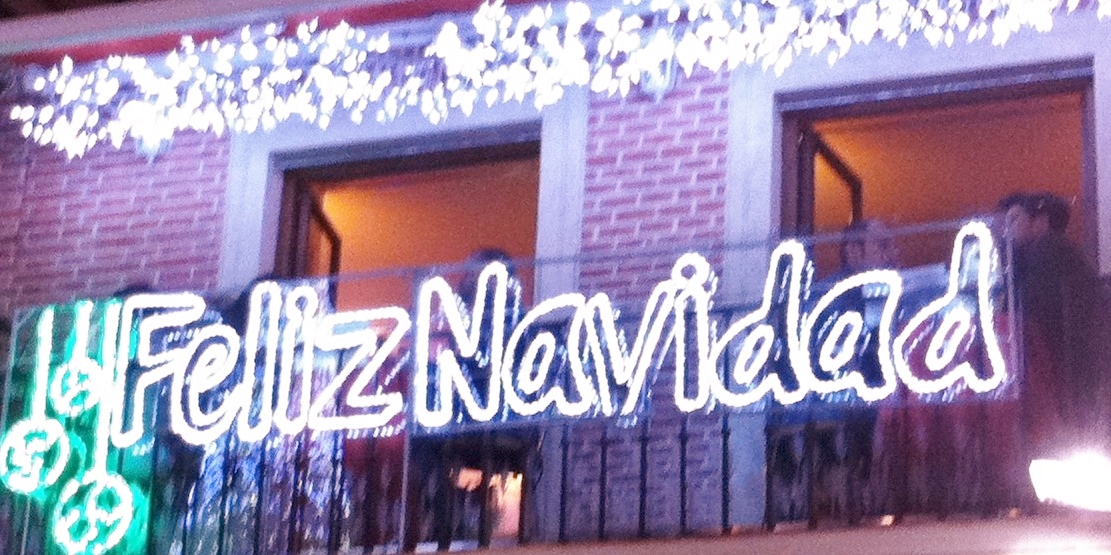 Málaga is a truly great city, and never more so than at Christmas. New traditions in a new country – for me, now, Christmas in unimaginable without a few days in Málaga. Satisfaction all round. Journey over. Málaga is a truly great city, and never more so than at Christmas. New traditions in a new country – for me, now, Christmas in unimaginable without a few days in Málaga. Satisfaction all round. Journey over.
© Tamara Essex 2013
THIS WEEK'S LANGUAGE POINT:
Please excuse this. I use the language point in the blog to pin down something I am struggling with. I find that trying to explain it, sets it more
firmly in my brain. And this week I’m trying to get to grips with ECHAR. Echar de menos, echar en falta – why two things that mean the same? Ah well.
Voy a echarle de menos. Voy a echarla en falta. I’m going to miss him/her. Voy a echar de menos estos días cuando vuelva al trabajo. I’m going to miss these days when I return to work. Te echo mucho de menos. I miss you greatly. Echo en falta tu compañia. I miss your company. Vas a echarle de menos. You’re going to miss him.
Thank you. That’ll help. It’s a jolly odd construction though, isn’t it?
 1
Like
Published at 3:39 PM Comments (0)
1
Like
Published at 3:39 PM Comments (0)
85 - The Rough with the Smooth
Thursday, December 12, 2013
So, you think it's warm all year round in Spain? Think again.
My village house is at 2,500 feet altitude, higher than anyone in the UK lives. And it's cold in winter. We sometimes get snow - only occasionally in the village but plenty on the hills around us. We are not far from the Sierra Nevada where the ski slopes opened early this year, at the end of November.
And as everyone who moved here from Britain will tell you, the houses aren't built to keep you warm in winter.
So round about now the expat internet forums are full of questions about wood deliveries, tips for using wood-burning stoves, and which type of radiators use the least electricity.
But there's an extra edge to the expat discussions this year. Because the British government, as part of the sweeping cuts which are affecting most of the poorest people in the country, is also planning to withdraw the Winter Fuel Allowance from British pensioners living in warmer countries.
 The English-language press in Spain has been full of this story, and in particular the letters pages. Outraged of Tunbridge Wells has retired and become Outraged of Torrevieja, penning strongly-worded letters, the indignation in which cannot be denied. "It's an outrage!" he writes. "I've paid my taxes" he fumes. "I moved here assuming I'd carry on getting that money" he explains. "They are driving a coach and horses through my human rights" he storms. The English-language press in Spain has been full of this story, and in particular the letters pages. Outraged of Tunbridge Wells has retired and become Outraged of Torrevieja, penning strongly-worded letters, the indignation in which cannot be denied. "It's an outrage!" he writes. "I've paid my taxes" he fumes. "I moved here assuming I'd carry on getting that money" he explains. "They are driving a coach and horses through my human rights" he storms.
Well no. Actually they're not.
This "breach of our human rights" is bandied around here with depressing frequency. It came up earlier this year when it emerged that changes to the satellites means we many well cease to receive free UK TV programmes. That was apparently a breach of our human rights, too. I have to say, I find this misuse of the words abhorrent.
The Universal Declaration of Human Rights is an incredibly important document, to which we should all be eternally grateful. In the main, most people reading this probably don't need to be personally grateful for it. We are fortunate that the rights it enshrines are pretty much standard in the country of our birth and in our adopted country. But if its existence helps support people who have real struggles for shelter, education or water, or who have real struggles against slavery, hunger, arbitrary arrest or torture, then it is doing its job and I for one am relieved it is there.
And we devalue it when we wave it around inappropriately. I remember sitting on the patio at home in Dorset during school playtime and hearing a teenage girl scream at a teacher "You can't make me do homework, it's against my human rights!" It makes me no less angry when it is waved around by grown adults who have, at some point in their lives, been comfortable enough to be able to make a decision to emigrate to a warmer country to work or to retire. "Outraged of Torrevieja" did not, I suspect, arrive on the Spanish mainland in an over-crowded boat across the Straits of Gibraltar. He (or she) did not escape slavery or war to arrive wounded and starving in an urbanisation on the Costas. "Outraged" had the western European assumptions of freedom of movement and the capacity to take advantage of it, and came here by choice.
Once here, "Outraged" naturally hoped nothing would change. Life was good, the exchange rate gave him a good pension, and the sun shone. Then his human rights were trampled on. The £200 Winter Fuel Allowance may be withdrawn. This, apparently, will drop "Outraged" into abject poverty. He threatens to move back to the UK where he will still be eligible for the £200 allowance.
My view is not shared by the majority of immigrants here. I think that things are constantly changing around us, and mostly we just have to live with it. Because of the age I am, I first saw my state pension slip away over the horizon as my retirement age was upped from 60 to 65. Then I was caught in the next tranche of delays, and I will get mine at 66. Or perhaps at sixty-six and a half. Certainly I lose over six years from what I grew up expecting - so, £42,000 or thereabouts. Shame. But things change.
I think immigration is a bit like a marriage. We should take some sort of vows. For richer, for poorer. In sickness and in health. In warm weather and in cold weather. The rough with the smooth. Yes, Spain is lovely and warm for about eight and a half months, and really very cold for about three and a half months. Yes pensioners could do with the Winter Fuel Allowance. Or perhaps they could just drop €10 into a piggy-bank every time they go out for a Menú del Día at €7 or €8 a head for a three-course meal including a drink (I think €10 would be about how much is saved each time compared to prices if we'd stayed in the UK). Do that once a fortnight, or just once a month if there are two of you, and the savings give you back the Winter Fuel Allowance.
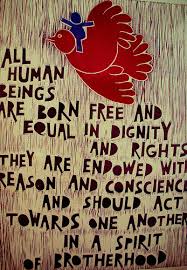 Alternatively, we can just shrug at these administrative changes and look around us. Where do I want to live? If the answer is Spain, then we have to take the rough with the smooth. And be grateful that all thirty Articles in the Universal Declaration of Human Rights are still in place, unbreached, at least for us. There is no “Article 31 – the inalienable right to watch EastEnders or Strictly, however far away I move”, or “Article 32 – the inalienable right to move to another country and still receive every single one of the discounts or allowances available to those in the UK (while failing to mention the benefits arising from my new country)”. Just the 30. Fighting for a life free of torture, slavery and hunger, where education and participation in democracy are available to all. Those really matter. Alternatively, we can just shrug at these administrative changes and look around us. Where do I want to live? If the answer is Spain, then we have to take the rough with the smooth. And be grateful that all thirty Articles in the Universal Declaration of Human Rights are still in place, unbreached, at least for us. There is no “Article 31 – the inalienable right to watch EastEnders or Strictly, however far away I move”, or “Article 32 – the inalienable right to move to another country and still receive every single one of the discounts or allowances available to those in the UK (while failing to mention the benefits arising from my new country)”. Just the 30. Fighting for a life free of torture, slavery and hunger, where education and participation in democracy are available to all. Those really matter.
© Tamara Essex 2013
THIS WEEK'S LANGUAGE POINT:
My intercambio friend had to write a paragraph in English about the area in which he lives. After I’d checked it for grammar (which was, as always, almost impeccable) he made me translate it into Spanish. He’s well ahead of me 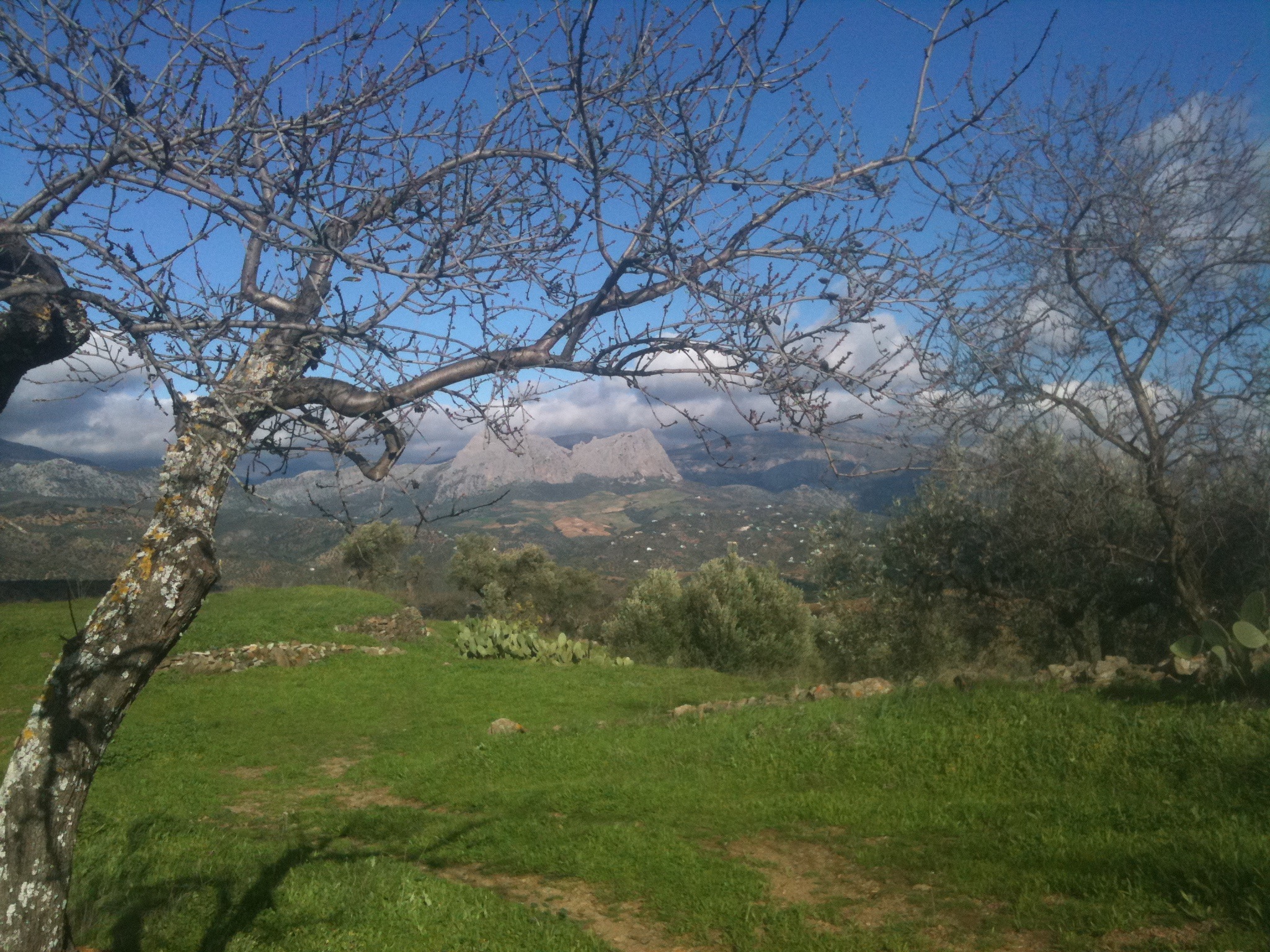 on grammar so there were some difficult phrases. But I loved it, as there were some really beautiful-sounding section. I especially liked En invierno llueve poco, y aunque llueva, después los cielos aclaran y el sol brilla de nuevo. In winter it doesn’t rain much, and even when it does rain, afterwards the skies clear and the sun shines again. Nice bit of subjunctive in there … “… even when it rains …”. Es casi tan agradable como el paraíso. It’s almost as lovely as paradise. Very true, Jose, very true. on grammar so there were some difficult phrases. But I loved it, as there were some really beautiful-sounding section. I especially liked En invierno llueve poco, y aunque llueva, después los cielos aclaran y el sol brilla de nuevo. In winter it doesn’t rain much, and even when it does rain, afterwards the skies clear and the sun shines again. Nice bit of subjunctive in there … “… even when it rains …”. Es casi tan agradable como el paraíso. It’s almost as lovely as paradise. Very true, Jose, very true.
 5
Like
Published at 9:02 PM Comments (6)
5
Like
Published at 9:02 PM Comments (6)
84 - The Hidden Language of the Soul
Thursday, December 5, 2013
It's a difficult topic to write about. I want to say that I've engaged with Spanish culture through and through and taken it to my heart. But there's no point lying. There's a lot about flamenco that I just don't get.
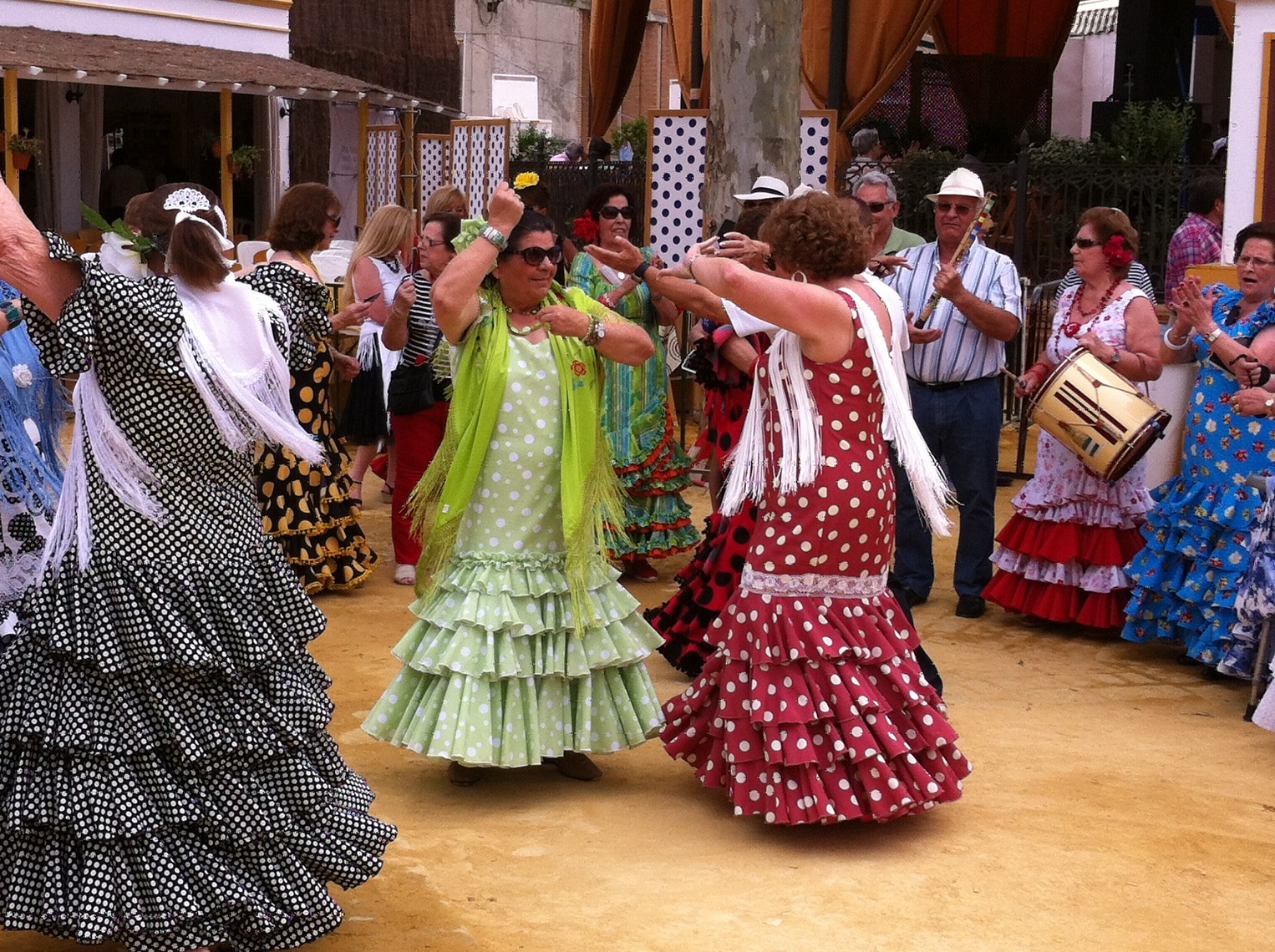 For a start, there's a massive range of flamenco, and often it's hard to know exactly what is being talked about. Adverts for "dinner with flamenco" need further exploration to ascertain whether this means guitar and singing, or dance as well. The "tourist" venues in the cities offer troupes of pretty girls in bright layered dresses, and village fiestas offer performances by cute kiddies and embarrassed teenagers. Great photo opportunities, and a sample (of a sort) of "Spanish culture". For a start, there's a massive range of flamenco, and often it's hard to know exactly what is being talked about. Adverts for "dinner with flamenco" need further exploration to ascertain whether this means guitar and singing, or dance as well. The "tourist" venues in the cities offer troupes of pretty girls in bright layered dresses, and village fiestas offer performances by cute kiddies and embarrassed teenagers. Great photo opportunities, and a sample (of a sort) of "Spanish culture".
And then there's the deep stuff. Quite impenetrable to an outsider. Frequently just guitar and voice. Hugely intense, often not entirely tuneful, wailing, more a deep, painful sound than anything recognisable as a song. And the audience is not a separate, passive thing. They are a part, they participate, living and breathing it, calling out, unable to control the cry of Óle, leaving the occasional visitor feeling even more an outsider, just not quite getting it.
So when a good friend invited me to a performance, I first had to check that there would be dance. I'd been to an evening of just guitar and voice in my village flamenco club, and had felt distinctly disconnected. I think I snuck out after half an hour. But yes, this time there would be dance and my friend said it would be good. We took our seats in the second row. An almost entirely Spanish audience awaited the start with breathless anticipation. The first chord from the darkness demonstrated that the guitarist was a true artist. One by one four women dancers wearing simple shifts emerged from behind screens. The singer joined them - a wonderful voice - and then a male dancer. No overly-frilled spotted dresses here, but a stripped-back rawness that was a million miles from the popular stereotype of flamenco. But while I could recognise the skill, I knew that I wasn't recognising all that those around me were seeing.
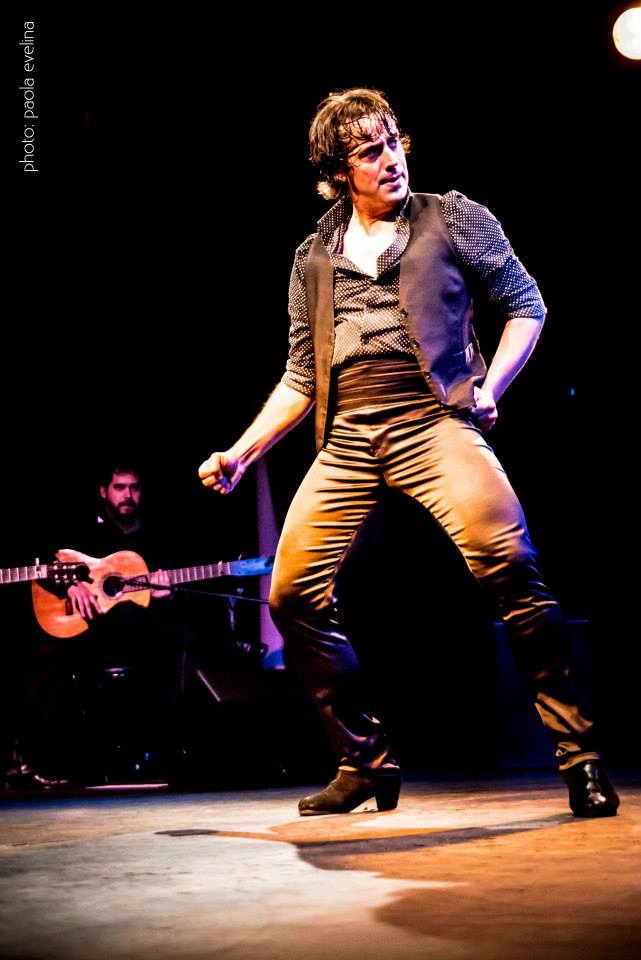 And then a second man stepped out from the wings. Jose Galvañ fixed his gaze on the audience, and slowly began to dance. Not dressed in the tight black trousers and shiny waistcoat of the commercial (tourist) flamenco, but in a much more rustic outfit. The intensity in his eyes, his fierce expression, the sheer force of his acting presence, and of course his dancing, were captivating. And after twenty minutes it dawned on me that I was watching not some regional cultural activity from the other side of Europe, but the international language of the stage. All at once, I felt as though I was watching characters from Thomas Hardy – Angel Clare, Jude, Farmer Oak - rough, poor country people, expressing the universal stories of conflict, struggle, and love. Into my mind came the rituals and performance styles of south-west England - and yes, even Morris-dancing seemed to have some links, some cross-over with what I was watching here, 1300 miles away in a Málaga side street. A fanciful idea? Not at all - the English name "morris-dance" was first recorded in the 15th century and did indeed come from Morisk, moresco, moorish dancing. Early dancers even put soot on their faces. Flamenco has roots arising from two ethnically separate but culturally-similar traditions in Andalusia, the Moorish history and the gitano (gypsy) traditions. Both dance forms have their roots in peasant, rural, folk-dancing, and even the costumes have some parallels. And then a second man stepped out from the wings. Jose Galvañ fixed his gaze on the audience, and slowly began to dance. Not dressed in the tight black trousers and shiny waistcoat of the commercial (tourist) flamenco, but in a much more rustic outfit. The intensity in his eyes, his fierce expression, the sheer force of his acting presence, and of course his dancing, were captivating. And after twenty minutes it dawned on me that I was watching not some regional cultural activity from the other side of Europe, but the international language of the stage. All at once, I felt as though I was watching characters from Thomas Hardy – Angel Clare, Jude, Farmer Oak - rough, poor country people, expressing the universal stories of conflict, struggle, and love. Into my mind came the rituals and performance styles of south-west England - and yes, even Morris-dancing seemed to have some links, some cross-over with what I was watching here, 1300 miles away in a Málaga side street. A fanciful idea? Not at all - the English name "morris-dance" was first recorded in the 15th century and did indeed come from Morisk, moresco, moorish dancing. Early dancers even put soot on their faces. Flamenco has roots arising from two ethnically separate but culturally-similar traditions in Andalusia, the Moorish history and the gitano (gypsy) traditions. Both dance forms have their roots in peasant, rural, folk-dancing, and even the costumes have some parallels.
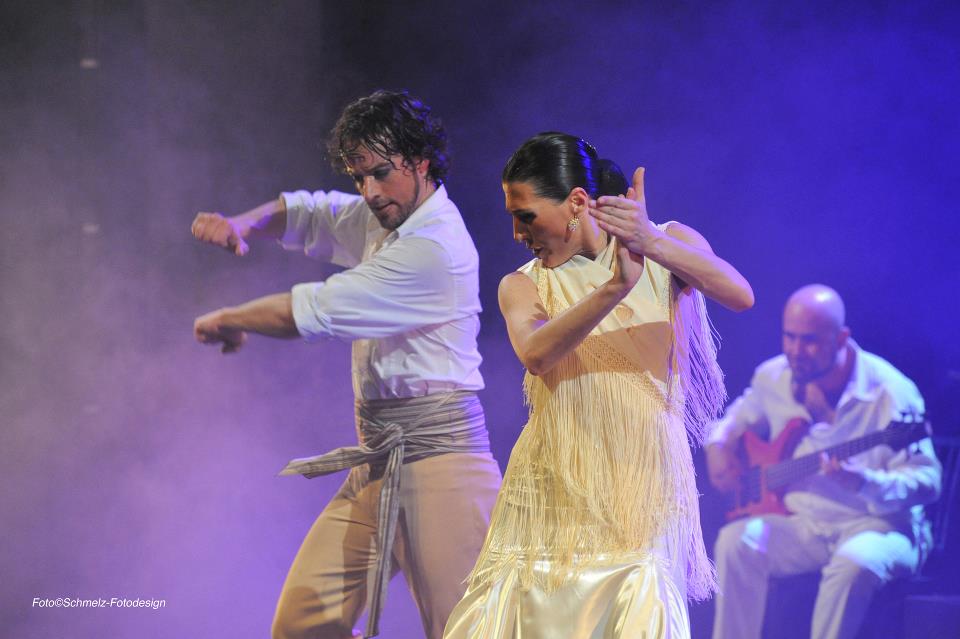 The greatest difference though lay in the story-telling. In Málaga's Teatro Echegaray a story unfolded. Angst, loss, suffering, anguish and earthiness .... whereas in my (albeit limited) experience of Morris-dancing I recall some stick-bashing, some handkerchief-waving, and some ringing of bells worn around the knees. The music too, whilst possibly both emerged from similar ancient rural traditions, has gone in very different directions in the two countries. The Spanish guitar, played with phenomenal sensitivity one moment and almost violence the next, is fundamental to flamenco, as is the cantante (singer). The greatest difference though lay in the story-telling. In Málaga's Teatro Echegaray a story unfolded. Angst, loss, suffering, anguish and earthiness .... whereas in my (albeit limited) experience of Morris-dancing I recall some stick-bashing, some handkerchief-waving, and some ringing of bells worn around the knees. The music too, whilst possibly both emerged from similar ancient rural traditions, has gone in very different directions in the two countries. The Spanish guitar, played with phenomenal sensitivity one moment and almost violence the next, is fundamental to flamenco, as is the cantante (singer).
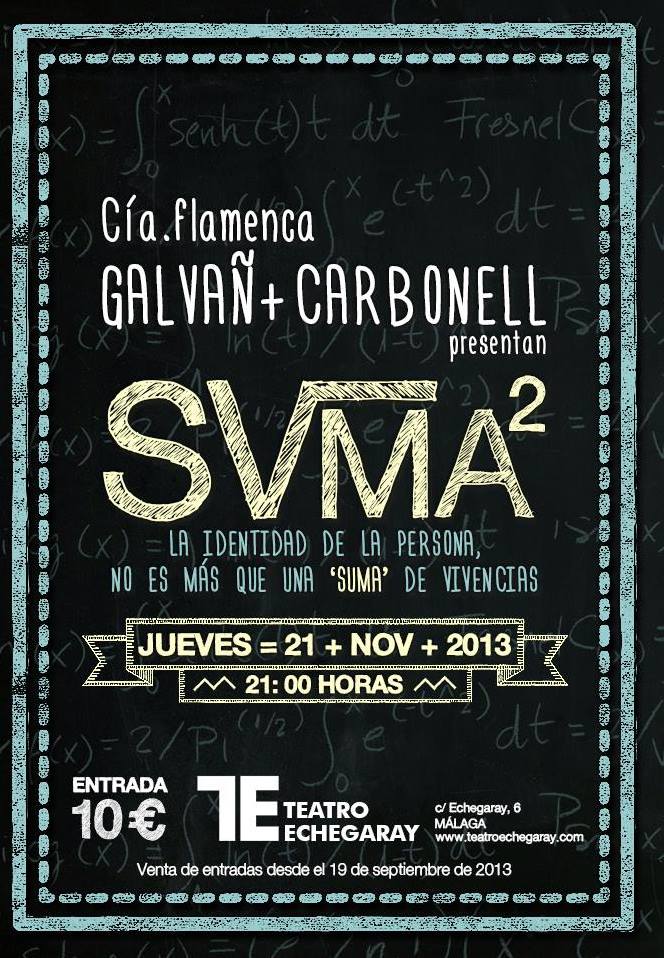 I'm not saying I got it - there were a million layers of meaning, pre-programmed into the DNA of the Andalucians, that remained a mystery to me. And I'm not saying I'm a convert - if, as on this night, I can be guided towards a "proper" performance I'd certainly go again, but I'm never going to become a regular at back-street flamenco clubs. The reactions of the Spanish people around me failed to draw me in - if anything they highlighted the wide cultural chasm that separates northern and southern europeans. I'm not saying I got it - there were a million layers of meaning, pre-programmed into the DNA of the Andalucians, that remained a mystery to me. And I'm not saying I'm a convert - if, as on this night, I can be guided towards a "proper" performance I'd certainly go again, but I'm never going to become a regular at back-street flamenco clubs. The reactions of the Spanish people around me failed to draw me in - if anything they highlighted the wide cultural chasm that separates northern and southern europeans.
But I got something. I got flicks of sweat from Jose Galvañ's face and hair. I got the expressions on his face, his intense physicality, the visceral emotion, and a lot of the story. The 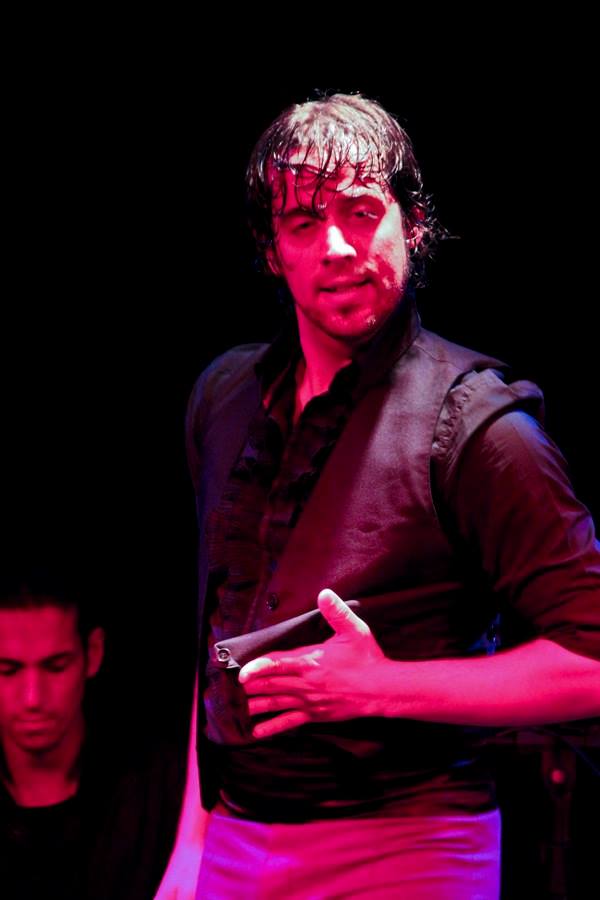 stage floor was the land beneath our feet and the dance arose directly from the earth. The singer's voice and the guitar spoke more than sounded. More than once I found myself holding my breath. stage floor was the land beneath our feet and the dance arose directly from the earth. The singer's voice and the guitar spoke more than sounded. More than once I found myself holding my breath.
I still think there's a chasm, but maybe it's narrower than I thought it was. An unexpected vision of Dorset's favourite son Thomas Hardy popping into my head in a flamenco concert in Málaga made a fragile connection across that great divide.
© Tamara Essex 2013
The title of this post is from Martha Graham: "Dance is the hidden language of the soul". The photos of the Jose Galvañ company are all his own.
THIS WEEK'S LANGUAGE POINT:
I got it wrong last week. I called the subjunctive a tense. Both here and on the blog homepage at A Foot in Two Campos a reader corrected me. The subjunctive is a mood, not a tense. They were right, I was wrong. And it's hard to say you're wrong. No really, it actually IS hard to say you're wrong - at least in Spanish.
It's a strange verb - equivocar. Me equivoco constantemente – I’m always making mistakes. Se equivoca – he’s wrong, he’s mistaken, he got it wrong. Me equivoqué – I was wrong, I got it wrong, I made a mistake (past tense). Yo estaba equivocada – I was wrong. Me he equivocada – I’ve made a mistake. ¡No, estás equivocado! – no, you’re wrong (or you made a mistake). In Spanish there’s no clear linguistic difference between being mistaken, and being outright wrong – those shades are done with the context and the tone of voice.
 0
Like
Published at 5:54 PM Comments (1)
0
Like
Published at 5:54 PM Comments (1)
Spam post or Abuse? Please let us know
|
|